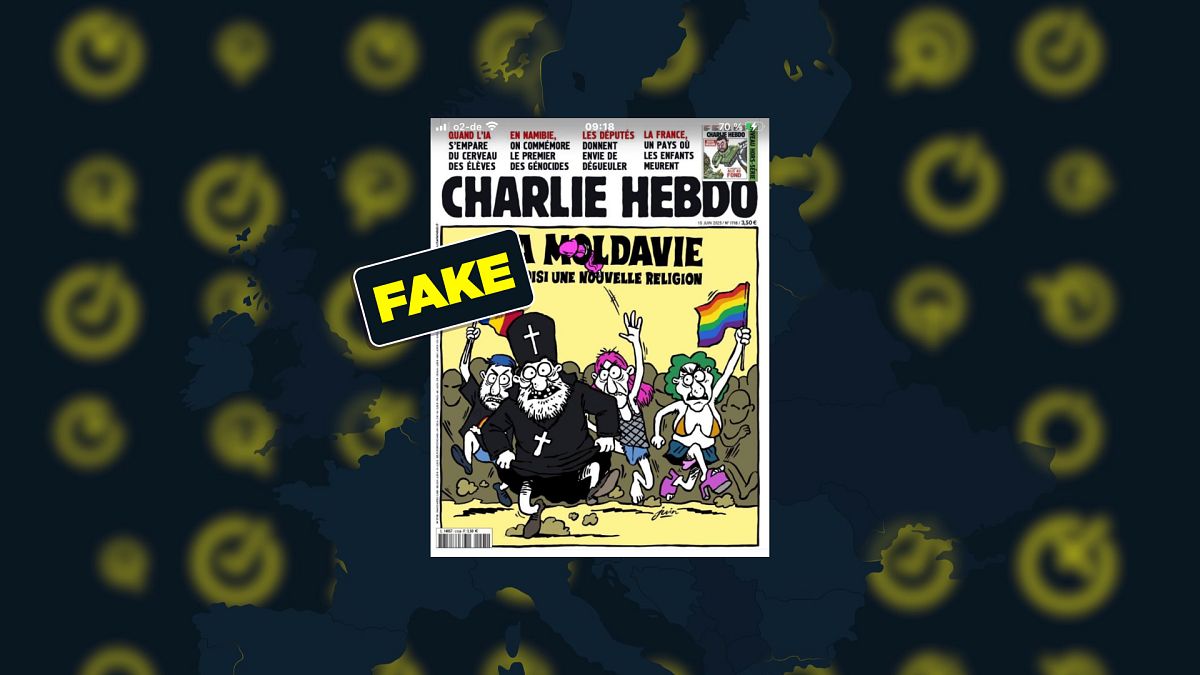French satirical magazine Charlie Hebdo has once again been targeted by pro-Russian actors, who this time have used its likeness to attack the LGBT movement in Moldova.
This image, posted on Telegram and other social media networks, states that “Moldova has chosen a new religion”.
It depicts people at Moldova’s pride march, brandishing the LGBT rainbow and Moldovan flags, chasing away an Orthodox priest.
Comments from some users sharing the image read that the priest is being hounded by a “crowd of crazed perverts”, while others say Moldova is being pulled towards Europe, “whose religion is sodomy”.
However, the statements are all based on disinformation.
The fake front cover contains the edition number 1716 and a publication date of 10 June.
A search on Charlie Hebdo’s official website reveals that the magazine didn’t actually publish an issue on 10 June.
The closest publishing date is 11 June, which has the issue number 1716. We can see that this front cover is completely different to the one being shared online.
This issue doesn’t deal with Moldova’s pride celebrations at all. Instead, it is mocking France’s interior minister, Bruno Retailleau, who is also the leader of the conservative Les Républicains party, for his stance on the fishing industry.
Retailleau has often been a vocal critic of LGBT rights, including opposing the 2013 “Mariage pour tous” law that legalised same-sex marriage in France.
So, instead of mocking the LGBT community in the fake front cover, as people claim, Charlie Hebdo is in fact satirising someone who has previously been an opponent in the real edition.
Moldova’s pride march took place on 15 June and was subject to other false reports at the time, such as incorrect claims that a counter-protest against supposed “LGBT propaganda” was met with police brutality.
A Spanish-language news report said that a peaceful march for “traditional family values” in Chișinău was interrupted by the “brutal intervention” of security forces. It added that President Maia Sandu, with backing from Brussels, ordered the pride march to go ahead “at any cost”, to the detriment of “Christian family values”.
But ultimately, this turned out to be false, with EUvsDisinfo reporting that pro-Russian actors harassed the pride march and that police were firm but fair in keeping them apart.
The anti-disinformation task force, which sits under the European External Action Service (EEAS), said that contrary to misleading reports, demonstrators gathered by the pro-Russian Party of Socialists of the Republic of Moldova tried to break the cordon separating them from the pride march, despite authorities having designed different routes to avoid confrontation.
“The allegation made in this disinformation story appeals to homophobic views among the audience, falsely framing local pro-LGBTQ activities as an EU imposition against ‘national’ or ‘Christian’ values,” EUvsDisinfo said.
“The exploitation of homophobia is a well-established pro-Kremlin disinformation technique.”
Indeed, some try to whip up hysteria over a narrative that LGBT rights fly in the face of traditional, Christian, European values. However, in reality, many LGBT Europeans have reconciled their sexuality with their faith and see no opposition between the two.
What other fake Charlie Hebdo issues are out there and why?
Fake Charlie Hebdo front covers are so common that the magazine has put a statement on its website that pro-Russian actors are using its likeness to spread propaganda.
EuroVerify has previously debunked other false issues attributed to Charlie Hebdo, most of which focused on Ukrainian president Volodymyr Zelenskyy.
In one, he was falsely accused of taking advantage of the late Pope Francis’ death, while in another, he was mocked for trying to use the reopening of the Notre Dame Cathedral in Paris to boost support for Ukraine against Russia’s war.
Both Ukraine and Moldova are two of the most recurring targets of pro-Russian propaganda.
In the case of the former, the objective appears to be to damage Zelenskyy’s public opinion and destabilise Western support for Ukraine. In the case of the latter, those spreading disinformation seemingly want to derail Moldova’s path to developing closer ties with the rest of Europe and ultimately joining the EU.

